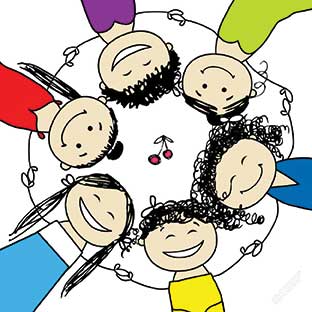Pooja Birwatkar
A few years back
There was a time when parents would wait for their children to return from school. All that happened in school, the highlights, the challenges of the day, activities that happened, home work that was given, everything was discussed. School bags were checked and school calendars were read regularly.
The scenario now
Mother: So what happened in school today?
Child: I am tired … See in WhatsApp
Mother: Thank God, WhatsApp is there or I would never know anything.
 Much before the child reaches home, parents are already aware of what happened in school, the kind of homework given, etc., courtesy WhatsApp and other social networking platforms. Life in school is shred and dissected every day. While it is good to be involved with the children, too much involvement spells danger. This has led to a kind of communication breakdown between parents and children. Children are aware that the parent is already in the know and any further questions from them are simply shrugged off by saying, “Find out from WhatsApp.”
Much before the child reaches home, parents are already aware of what happened in school, the kind of homework given, etc., courtesy WhatsApp and other social networking platforms. Life in school is shred and dissected every day. While it is good to be involved with the children, too much involvement spells danger. This has led to a kind of communication breakdown between parents and children. Children are aware that the parent is already in the know and any further questions from them are simply shrugged off by saying, “Find out from WhatsApp.”
This would have been acceptable if parents discussed only school work. But sample this:
Parent1: My child was absent today. Can someone share the home work and what was done in school?
Some parent puts pictures of the work done.
Parent 1: Thanks. Oh, wow! Your child’s handwriting is so good. My child writes so shabbily. You are such a lucky parent.
The parent even goes to the extent of taking pains to click pictures of the child’s shabby work and put them on the WhatsApp group for another 30-40 parents to see.
Parent: My daughter won the first prize in dance competition.
This is followed by a spate of likes and congratulation and comments such as
Your daughter is so good.
Wish my child was like her
My son is so lazy
My son never copies the class work
She doesn’t know what was done.
Her mind is always elsewhere
Unknowingly, parents are creating mental images of their children in other parents’ minds. This is intruding upon the child’s privacy. No parent would like their flaws being discussed on these groups by the children, then why don’t parents realize that they are somewhere making the lives of their kids too public? Even without meeting these kids, the WhatsApp parents group has already labelled the kids in class as the lazy one, the brilliant one, the abuser, the deviant one, the good mannered child and so on.
 Parent1: Have hindi books come home after correction? In my child’s book the teacher has failed to correct the spelling of one word.
Parent1: Have hindi books come home after correction? In my child’s book the teacher has failed to correct the spelling of one word.
Parent 2: This calls for action.
Parent 1: Yes. Hindi teacher is not paying attention.
Parent 4: We should go in a group and report to school.
Parent 5: Even that day math teacher didn’t check the notebooks.
Parent 6: I am not happy with the English teacher.
Parent 7: Please check notebooks and see when was the last time that English Notebooks were checked.
Parent 8: In science also the teacher has been teaching the same chapter for a month… How will she complete the syllabus?
Everything that happens in school is discussed at length, the teachers, their behaviours, the school activities and even traffic woes outside the school. So much discussion leads to a formation of opinions which are clouded more by the other’s perceptions rather than by individual first-hand experience. Parents at times are crude in discussing teachers, their teaching styles and overall functioning of the school. More so, they are careless enough to let their kids read such subjective conversations. Imagine the effect on the mind of the child who reads these comments about his/her teacher. It somehow shakes the whole ideology of the Guru-Shishya Parampara which India is famous for. This analysis coupled with misinformation and gossip yields disastrous results. A child who reads such derogatory comments about a teacher may reflect it in his behaviour at school. Children have the tendency to discuss what adults discuss and hence such conversations go viral very soon.
A regular PTA meeting some years ago had its own charm. Anxious parents would wait for the teacher to make remarks about their kids. Today’s parents just do not have the patience to wait. The teachers are made part of the WhatsApp groups, or are even directly approached. The slightest query about the child at any unearthly hour is asked. Isn’t this an encroachment of the teacher’s private space? Parents discuss at length about the kind of questions they will ask at PTA meetings in the WhatsApp group. Any annoyance or query that needs to be highlighted is then decided in these groups to be asked by a lot of parents, in order to build more pressure on the teachers.
There is no denying that a child’s first teacher is her parent and parents have every right to play a role in their child’s education. The advantages of a parent’s active involvement in a child’s education are manifold and include improved student performance and the development of learning skills. However this helicopter parenting is somewhere detrimental to the present learning scenario. Excessive social media usage is fuelling this kind of parenting, which in the long run, may have serious repercussions on the parent and school relationship.
What schools can do
- Clearly communicate to parents the extent of their involvement with the school and the restraints.
- Have a strict policy of no direct communication with teachers unless there is an emergency.
- Only PTA members to communicate with the school and teachers.
- Regularly counsel parents against discussing too much about schools in groups and also request them to not let children read the messages.
- Have updated school websites with daily information regarding the activities done in schools, the proposed activities, schedules, time tables, etc., so that parents can find all information there.
The author is a teacher educator at Somaiya College of Education, Mumbai. She can be reached at is puja1410@gmail.com.
